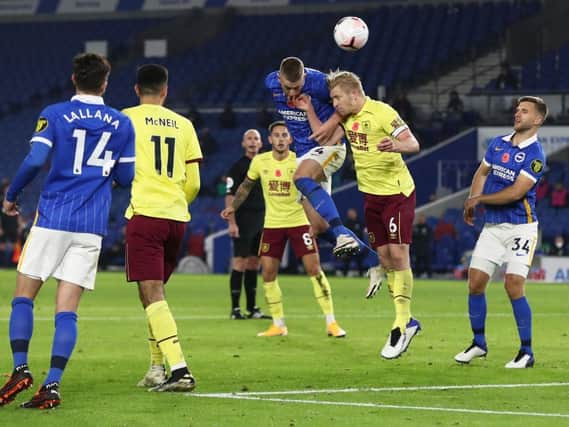Analysis: Here's why Brighton and Hove Albion might play so many short corners


Brighton had a total of five corners against Burnley in their last Premier League game, all of them were taken short. This was at a time when the Seagulls needed a goal in a less than entertaining 0-0 draw at home to Sean Dyche's men where all three points were up for grabs.
As a fan you just think 'stick it in the box and stop messing about'. It's how we have all grown up watching football, believing corners are a good opportunity to create danger and score a goal... or are they?
Advertisement
Hide AdAdvertisement
Hide AdJose Mourinho has previously been quoted as saying: "How many countries can you think of where a corner kick is treated with the same applause as a goal? One. It only happens in England."
In Chris Anderson and David Sally's highly-regarded book The Numbers Game they agree with Mourinho and proceed to bust the myth that corners are good goal scoring opportunities.
Anderson and Sally said: "Teams that shoot more and get more corners do not score more goals. The total number of goals a team scores does not increase with the number of corners it wins. The correlation is essentially zero. You can have one corner or you can have 17 corners: it will have no significant impact on how many goals you score.
"Surely corners cannot be that ineffective? But they are, for all that football's lore - and our own memories - want to trick us into believing that they are not."
Advertisement
Hide AdAdvertisement
Hide AdThe pair used data from StatDNA to examine what happened after a corner was taken in a sample of 134 Premier League matches from the 2010-2011 season - a total of 1,434 corners.
Anderson and Sally said: "We were expecting to see proof of the following: corners lead to shots, shots lead to goals. Corners, then, should lead to goals. We expected a degree of slippage. Not every corner leads to a shot: the defence is packed tightly to ensure that they do not."
What the data analysts found was unexpected. Only 20.5% of corners led to a shot. In other words, one in five corners led to a shot on goal. Or, another way of putting it, four in five corners did not lead to a shot.
The pair also unearthed more myth-busting evidence. They found that one of every nine shots produced from corners led to a team scoring. The other 89% of shots on goal from corners transpired to nothing.
Advertisement
Hide AdAdvertisement
Hide Ad"When we combine the odds of corners generating a shot on goal plus the odds that these shots will find the back of the net, our data show that the average corner is worth about 0.022 goals, or - more simply - that the average Premier League team scores a goal from a corner once every ten games," Anderson and Sally said.
In total, according to the data analysts, the net goal difference of corners is zero. So for every one goal the average Premier League team scores from a corner, they will concede from one i.e. getting caught on the counter attack.
The analysts go on to mention the great footballing teams such as Barcelona and Spain and how they both prefer to go short to retain possession and at the same time prevent a counter attack.
I'm not putting Brighton into the same bracket as Barcelona and Spain, but they do play a similar style of possession-based football with short, technical players, who create things on the floor and less so in the air.
Advertisement
Hide AdAdvertisement
Hide AdWe also know Graham Potter is a young, intelligent and open-minded manager who plays a more modern style of football and that Tony Bloom is a successful poker player who thinks in numbers and statistics for a living. There is method behind the so-called madness that is short corners.
Anderson and Sally end by saying: "Next time your side wins a corner think twice before urging your tallest players forward. It may be better to play it short, to retain possession, than to hit and hope. The numbers can help us see the game in a different light. What we have always done is not necessarily what we must always do."
To buy The Numbers Game, visit https://www.amazon.co.uk/Numbers-Game-Everything-About-Football/dp/0241963621
Follow this writer on Twitter @LoganMacLeod8